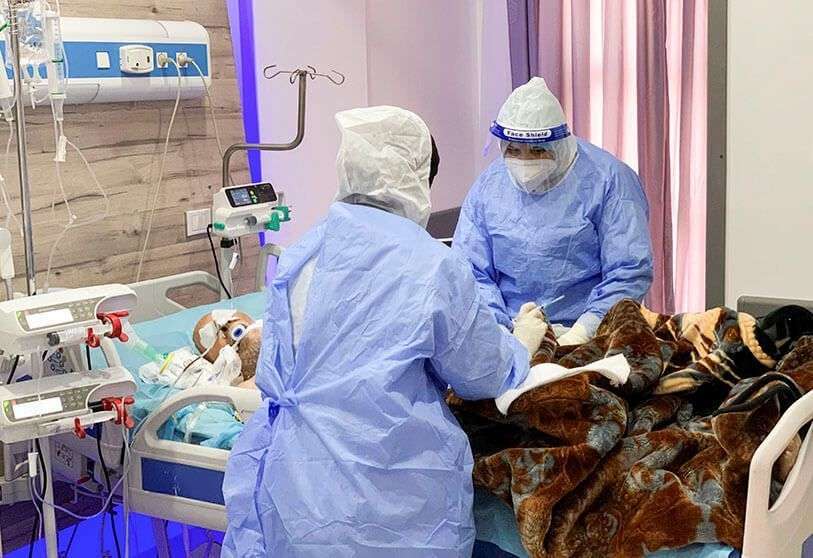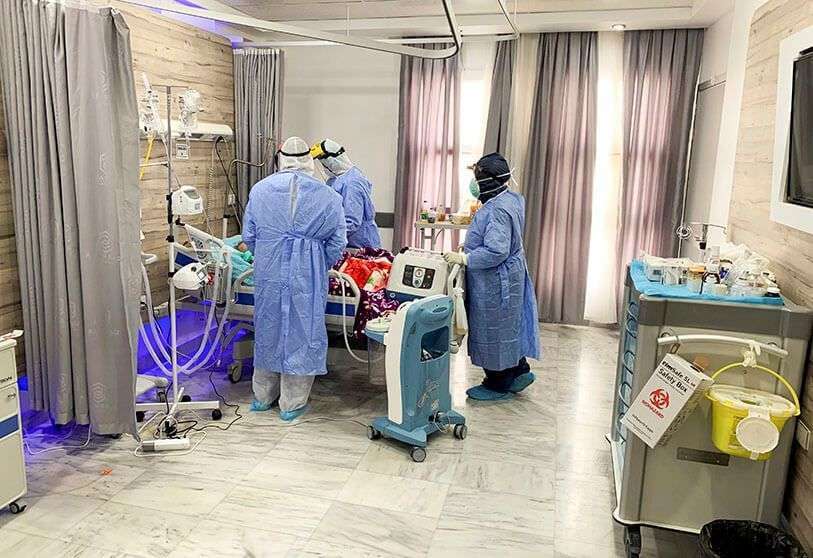From war to coronavirus, Libya's health system is overflowing

It has been six months since the VID-19 pandemic arrived in Libya and doctors working in hospitals are living a nightmare. Health infrastructures are not complete, not all clinics are operational due to the aftermath of the war and cases of coronavirus are increasing daily. Hamza Abdulrahman Jelwal, 35, a supervising nurse in a quarantine centre in the coastal town of Misrata, has not seen his family since the quarantine began. But this is not the worst of her job prospects: besides, the government is not paying her salary.
Jelwan tested positive for coronavirus in August and was quarantined at the same facility where she worked. As soon as she got better, she got up and went back to work. "We work twelve hours a day. It's exhausting for the medical staff because there are no breaks," the nurse explained to Reuters news agency. The lack of means to pay the salaries of the health workers has had serious consequences. Many health workers have resigned from their jobs, leaving the few positions that were already in the health system unfilled. Health workers report that "there are few ventilators and little equipment to deal with such a pandemic".
State financing, regularly affected by deficits and delays, has been interrupted this year owing to the six-month blockade of oil exports by the Libyan National Army (LNA) and its allies. A week ago Haftar's executive announced that they will resume export activities in order to prevent the country's economic and energy crisis from worsening any further.

The challenge facing Libyan doctors as the number of confirmed cases increases is marked by the lack of infrastructure and the armed conflict in the country. The numbers are increasing daily, leaving a trail of more than 20,000 confirmed cases. The UN interim envoy to Libya, Stephanie Williams, told the Security Council that the actual number of cases in Libya is almost much higher and that the health system "does not have the infrastructure to respond with the seriousness that the pandemic deserves".
In recent weeks the Libyan population has taken to the streets to protest against the mismanagement of the pandemic, the intermittent power cuts they are suffering due to the energy crisis and the few social measures being taken to alleviate this crisis. Because of these protests, the executive of the Tobruk parliament, which is close to Marshal Haftar, has resigned in full peace talks.

Libya has been in a civil war since 2014 and the country is divided between the internationally recognised National Accord Government (NAG) in Tripoli and the west, and the eastern and southern areas controlled by the Libyan National Army. The two rival administrations are currently negotiating a peace agreement in Morocco. The dialogues will put on the table a number of mechanisms for ending the conflict and beginning a democratic transition for Libya. With respect to the pandemic crisis, both executives have issued different public health orders aimed at controlling the spread of the virus. In addition, both closed their foreign borders at the beginning of the crisis.
Despite the closure of borders and the compulsory quarantine decreed in the two opposing territories, an outbreak began in July in the southern town of Sebha. This outbreak, like many others in isolated towns, was due to Libyans returning home after being stranded abroad. Following this massive return, the virus has spread to the major urban centres of Tripoli, Misrata and Benghazi. No part of the country has been spared from the pandemic.
The quarantine centre where Jelwal works in Gharara district was originally a private clinic. But due to the coronavirus it has become a state-monitored clinic attached to the medical centre in Misrata. This is not the only scenario that is choking the health system. Médecins Sans Frontières, which works in Libya to look after the detention centres for migrants arriving in the country to cross the Mediterranean, has seen its activities restricted due to the quarantine.

The movement of humanitarian personnel has been affected by the restrictions imposed, although the NGO confirms to Atalayar that they continue to work in six different detention centres (in Tripoli, Khoms, Zliten, Zintan, Zuwara and Zawiya) providing first aid and primary health care to people arriving in the country. Because of the pandemic, Médecins Sans Frontières has begun to provide coronavirus-related training to Libyan medical personnel, reinforcing infection prevention and control activities, especially in the detention centres, where "inhumane conditions" are being experienced, the organisation reports. The Mediterranean country has several challenges to face. The health crisis adds to the energy-economic crisis and, if a political solution is not agreed soon for the country, the threat of Islamic terrorism may leap from the background to become unprecedented news.








